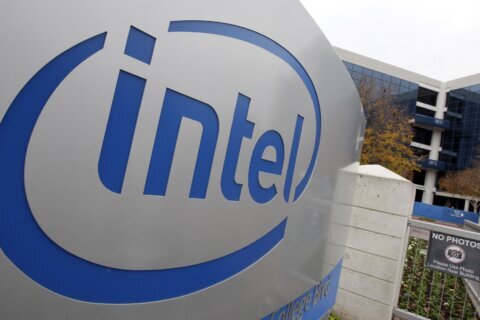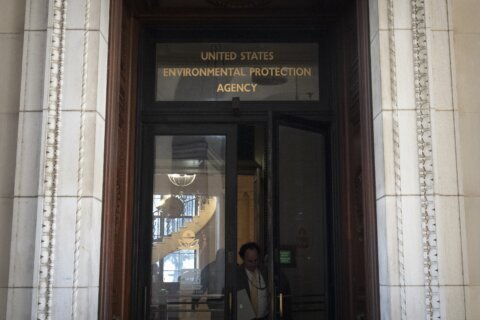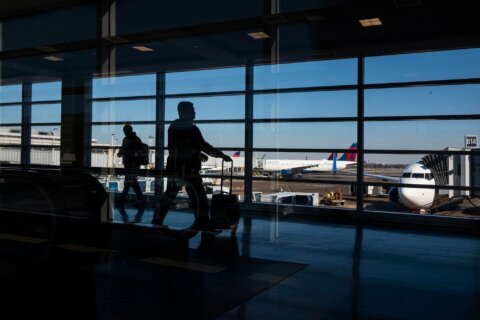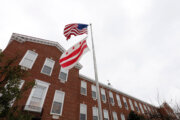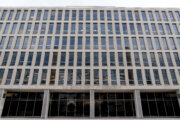NEW YORK (AP) — A rising tide swept stocks higher, and calm returned to Wall Street after Japan’s market soared earlier Tuesday to claw back much of the losses from its worst day since 1987.
The S&P 500 climbed 1% to break a brutal three-day losing streak. It had tumbled a bit more than 6% on a raft of concerns, including worries the Federal Reserve had pressed the brakes too hard for too long on the U.S. economy through high interest rates in order to beat inflation.
The Dow Jones Industrial Average rose 294 points, or 0.8%, while the Nasdaq composite gained 1%. Stocks of all kinds climbed in a mirror opposite of the day before, from smaller companies that need U.S. households to keep spending to huge multinationals more dependent on the global economy.
Stronger-than-expected profit reports from several big U.S. companies helped drive the market. Kenvue, the company behind Tylenol and Band-Aids, jumped 14.7% after reporting stronger profit than expected thanks in part to higher prices for its products. Uber rolled 10.9% higher after easily topping profit forecasts for the latest quarter.
Caterpillar climbed 3% after the maker of heavy machinery reported stronger earnings than expected.
The whiplash moves for financial markets globally have been the result of several technical factors, not just worries ignited by several weaker-than-expected reports on the U.S. economy, in what strategists at Barclays called “a perfect storm” for causing extreme market moves. One is centered in Tokyo, where a favorite trade for hedge funds and other investors began unraveling last week after the Bank of Japan made borrowing more expensive by raising interest rates above virtually zero.
That scrambled trades where investors had borrowed Japanese yen at low cost and invested the cash elsewhere around the world. The resulting exits from those investments may have helped accelerate the declines for markets around the world.
Japan’s Nikkei 225 jumped 10.2% Tuesday to claw back much of its 12.4% sell-off the day before, which was its worst since the Black Monday crash of 1987. Stocks in Tokyo rebounded as the value of the Japanese yen stabilized against the U.S. dollar following several days of sharp gains.
“The speed, the magnitude and the shock factor clearly demonstrate” how much of the moves were driven by how traders were positioned, according to the strategists at Barclays led by Stefano Pascale and Anshul Gupta.
Still, some voices along Wall Street are continuing to urge caution.
Barry Bannister, chief equity strategist at Stifel, is warning more drops could be ahead because of a slowing U.S. economy and sticky inflation. He’s forecasting both will be worse in the second half of this year than what much of Wall Street expects, while saying a measure of how expensive the U.S. stock market is still looks “frothy” when compared with bond yields and other financial conditions.
The stock market’s “dip is not a blip,” he warned in a report, and called it “too soon to jump back in.”
He had been predicting a coming “correction” in U.S. stock prices for a while, including an acknowledgement in July that his initial call was early. That was a couple days before the S&P 500 set its latest all-time high and then began sinking.
While fears are rising about a slowing U.S. economy, it is still growing, and many economists see a recession in the next year or so as unlikely. The U.S. stock market is also still up a healthy amount for the year so far, and the Federal Reserve says it has ample room to cut interest rates to help the economy if the job market weakens significantly.
The S&P 500 has romped to dozens of all-time highs this year and is still up nearly 10% so far in 2024, in part due to a frenzy around artificial-intelligence technology. Critics have been saying that euphoria has sent stock prices too high in many cases.
They’ve pointed in particular to Nvidia, Apple and the other handful of Big Tech stocks in the “Magnificent Seven” that were the main reason the S&P 500 set so may records this year. They helped overshadow weakness across other areas of the stock market, which were struggling under the weight of high interest rates.
A set of underwhelming profit reports recently, kicked off by Tesla and Alphabet, added to the pessimism and dragged Big Tech stocks lower. Nvidia dropped nearly 19% from the start of July through Monday on such concerns, but it rose 3.8% Tuesday and was one of the strongest forces pushing upward on the market.
Apple, though, slipped another 1% and was the heaviest weight on the market.
All told, the S&P 500 rose 53.70 points to 5,240.03. The Dow added 294.39 to 38,997.66, and the Nasdaq gained 166.77 to 16,366.85.
In the bond market, Treasury yields climbed to claw back some of their sharp drops since April, which were driven by rising expectations for coming cuts to interest rates by the Federal Reserve.
The yield on the 10-year Treasury rose to 3.88% from 3.78% late Monday. It had briefly dropped below 3.70% during Monday when fear in the market was spiking and investors were speculating the Federal Reserve could even have to call an emergency meeting to cut interest rates quickly.
___
AP Business Writers Elaine Kurtenbach and Matt Ott contributed.
Copyright © 2025 The Associated Press. All rights reserved. This material may not be published, broadcast, written or redistributed.

